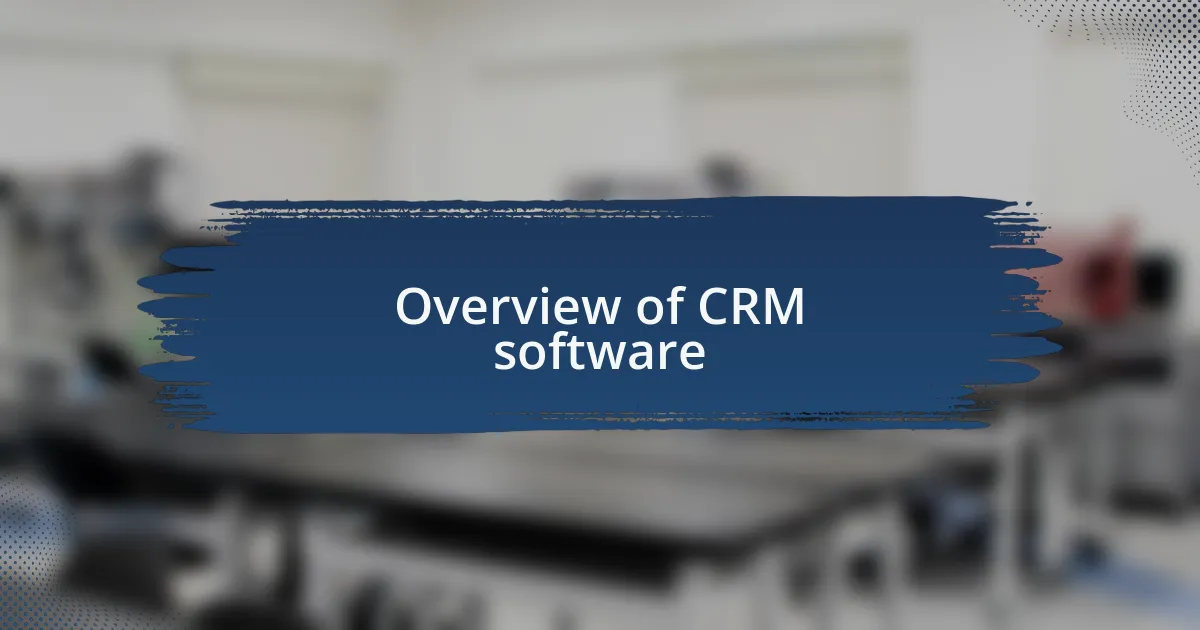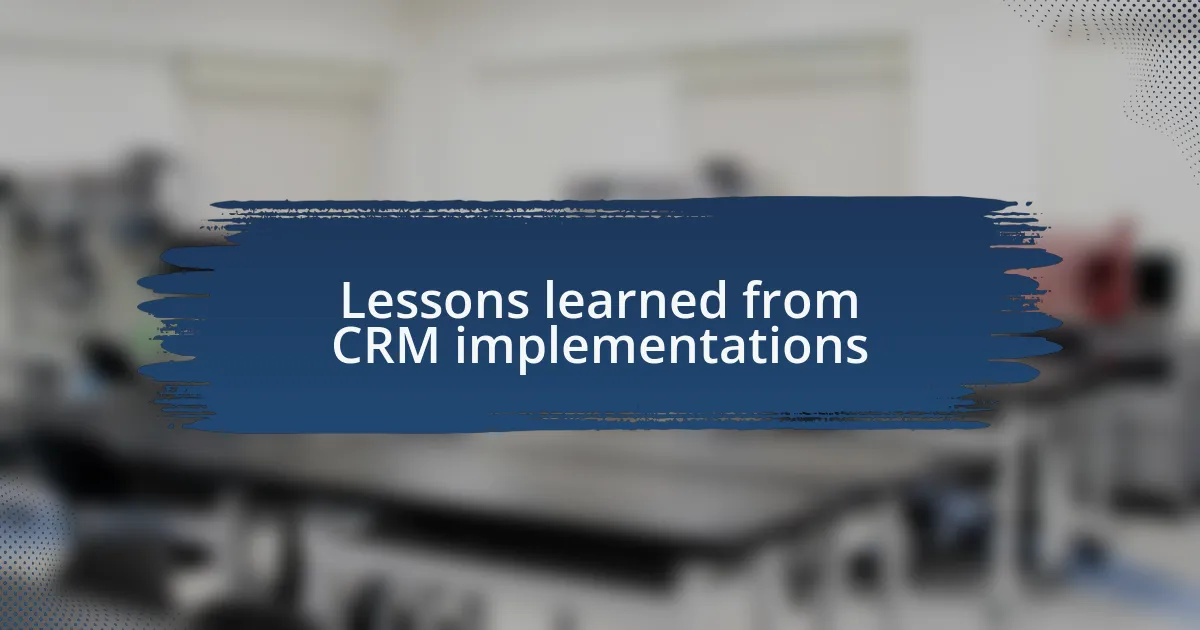Key takeaways:
- CRM software enhances customer interactions by centralizing communication, tracking sales, and providing marketing automation.
- Improved team collaboration and access to shared information are significant benefits of integrating CRM systems.
- Common challenges include steep learning curves, data migration issues, and inadequate vendor support during trials.
- Successful CRM implementation requires user training, customization, and regular feedback from team members to optimize usage.

Overview of CRM software
Customer Relationship Management (CRM) software serves as a centralized hub where businesses can manage their interactions with customers and streamline processes. I remember my first experience with a CRM system; it felt like stepping into a world where I could finally track every conversation and note every detail about my clients. Can you imagine having all that information at your fingertips?
These tools go beyond just managing contacts; they include features like sales tracking, marketing automation, and customer support. When I first explored these functionalities, I realized how they could transform a chaotic workflow into a well-oiled machine. It’s fascinating to see how CRM software can help identify customer’s needs, ensuring they feel valued and understood.
In my experience, the true power of CRM software is in its ability to foster relationships. After I utilized a CRM, I noticed that my communication became more personalized and effective. Have you ever considered how effective your communication could become with the right tools? With CRM, you can focus not just on closing deals, but on building lasting connections.

Importance of CRM for businesses
The importance of CRM for businesses cannot be understated. When I first started using a CRM, I was amazed at how it shifted my perspective on customer interactions. It wasn’t just about recording data; it became a channel for understanding what my clients really wanted. Reflecting on my journey, I can confidently say that having this insight fosters loyalty when customers feel their needs are truly being met. Does your current system allow you to connect with your clients on such a personal level?
Another standout benefit of CRM systems is their ability to improve team collaboration. I remember a time when my team struggled to stay on the same page, causing delays and confusion. Once we integrated CRM software into our processes, it changed everything. Everyone had access to the same information, which led to better communication and a collective effort toward achieving our goals. Do you ever feel that miscommunication could hold your business back?
Finally, CRMs offer invaluable analytics that can guide strategic decision-making. I was once taken aback by how a simple report could reveal trends that I hadn’t noticed before. This clarity helped direct my efforts where they mattered most, optimizing our marketing campaigns and boosting our sales. Have you ever felt lost when trying to interpret your business data? With CRM tools, the path becomes clearer, turning insights into action.

Common challenges with CRM trials
Many users, including myself, often encounter steep learning curves when trying out CRM software for the first time. I remember feeling overwhelmed by the myriad of features and settings, leading to frustration and even abandoning trials prematurely. Have you ever felt like giving up when faced with a complex system that doesn’t seem intuitive?
Another common challenge is data migration. I faced this hurdle when I switched to a new CRM—moving existing customer data into the new system was nothing short of a headache. It requires not only time but also precision to avoid losing essential information. Have you considered how you would handle transferring your data without losing important details?
Lastly, the lack of adequate support from CRM vendors can make trials feel daunting. I recall a frustrating experience where I had questions about specific functionalities, but the support team was unresponsive, leaving me to navigate the software alone. I often wonder, how can a company expect clients to thrive with their product if the support isn’t there when it’s needed most?

My experience with CRM trials
Trying out different CRM software sometimes felt like embarking on a complicated treasure hunt. I vividly remember my first trial where I stumbled upon features that seemed promising but were buried under layers of menus. It was both exhilarating and frustrating, as I constantly asked myself, “How do I find what I need without becoming lost in all this?”
There was one trial where I truly experienced the panic of impending deadlines. I had promised my team that we’d make an informed decision quickly, but as I navigated the platform, I realized how little I understood the integration options. The clock was ticking, and I couldn’t help but think, “Am I making the right choice, or am I just adding more stress to my plate?”
On the flip side, I also had moments of sheer joy when a feature clicked, and everything started to make sense. I remember a late night, pouring over the product’s functionalities, and finding a tool that streamlined our communication efforts. In that moment, I felt a rush of excitement and thought, “This is what I’ve been looking for!” Those moments reminded me of the potential that CRM systems have to transform how we engage with our clients and manage our work.

Lessons learned from CRM implementations
Implementing CRM software taught me the importance of user training. I distinctly remember a trial where we rushed through the onboarding process without ensuring everyone was on board. As a result, a few team members were fumbling during client interactions, leading to awkward conversations and lost opportunities. How could we expect to leverage the full potential of the CRM if our team wasn’t equipped to use it effectively?
Another key lesson arose from the need for customization. During one implementation, I assumed the default settings would suffice. However, as I watched my colleagues struggle with fields that didn’t align with our business model, I realized that a one-size-fits-all approach doesn’t work. Had I taken the time to tailor the system from the start, we could have saved valuable time and avoided unnecessary frustrations.
Finally, I learned the significance of feedback loops. In a particular trial, I made an effort to gather input from team members on their experiences with the system. The insights they provided were eye-opening; many features went unused simply because they were either confusing or not suited to our workflow. This experience highlighted that soliciting feedback isn’t just a formality—it’s essential for successful CRM adoption and continual improvement. What better way to evolve our processes than by listening to those who engage with the system daily?